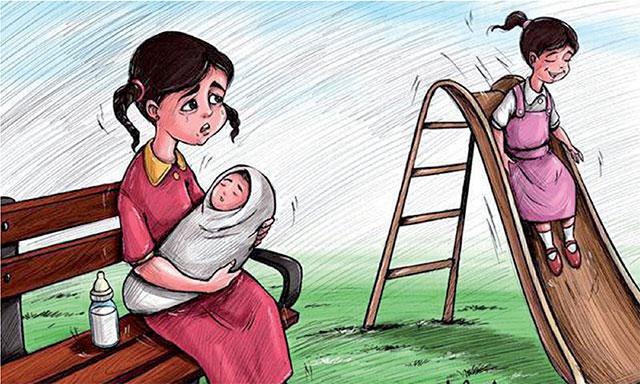You are here
Social Development Ministry, UNICEF discuss national strategy on foster care
By JT - Aug 22,2017 - Last updated at Aug 22,2017
AMMAN — “While she sleeps beside me, I can’t stop gazing and admiring her beautiful innocent face,” said Amra (name changed). “I can’t believe I have a baby now!” Like any new mother, she is besotted with her baby girl.
Unlike most mothers, however, Amra did not give birth to her child. She met her 13 month old daughter Ruba (name changed) through the foster care programme in Jordan.
With estimates of close to a 1,000 children in Jordan with no parents or family members, the Ministry of Social Development (MoSD) and UNICEF on Tuesday convened a meeting with judges, legal experts and community-based organisations to discuss strategies and plans aimed at strengthening and expanding the foster care programme in the Kingdom, a UNICEF statement said.
“An important clause in the Convention on the Rights of the Child on early childhood protection programmes focuses on family protection, which also includes family foster care for children who do not have parents or relatives,” said the Minister of Social Development Hala Lattouf.
A 2011 study conducted by the government and UNICEF compared the well-being of children living in care centres with their peers who live in foster families. Findings showed that children and youth living in institutions experienced emotional and behavioural difficulties at much higher rates than their peers living with families, according to the statement.
Based on the findings, MoSD and UNICEF, in partnership with Columbia University, initiated the Community-Family Integration Team (C-FIT) programme, which has brought about a "paradigm shift" in adapting evidence and community-based approach to child care and the prevention of institutional placement of children, according to the statement.
The C-FIT programme has found homes for nearly 150 children, but there are more than 600 children still waiting to find a loving home and a family.
Lattouf noted that, despite the success of the programme so far, there are still challenges. She noted these can be overcome by further enhancing knowledge and capacities of service providers and potential foster families, and strengthening partnerships and systems, as reflected in the Jordan Vision 2025 document, and in the MOSD’s2017-2021 Planning Strategy, the statement continued.
“Children living in institutions, without the protection and care of parents or family member, are often the most vulnerable in society,” UNICEF Jordan Representative Robert Jenkins was quoted in the statement as saying.
“UNICEF is committed to continue supporting the government in strengthening social care and the foster care programme, for the well-being of all vulnerable children without parental care in Jordan,” he added.
Related Articles
AMMAN — The German ambassador to Jordan, Birgitta Siefker-Eberle, has launched a new programme to support UNICEF Makani centres over the nex
AMMAN — Family disintegration, poverty and lack of education are considered to be some of the key factors behind an increase in the rate of
AMMAN — When Sarah was born, she had narrow chances of receiving foster care due to her birth defects, but that did not stop her from finall













